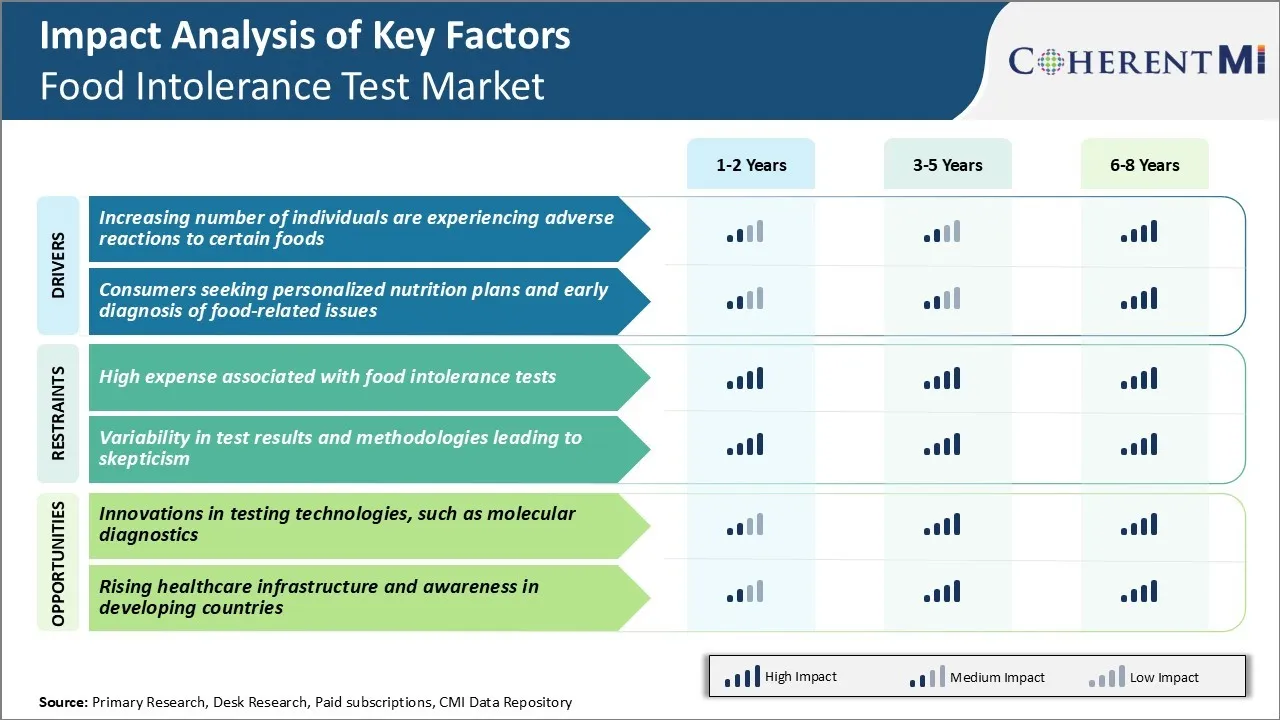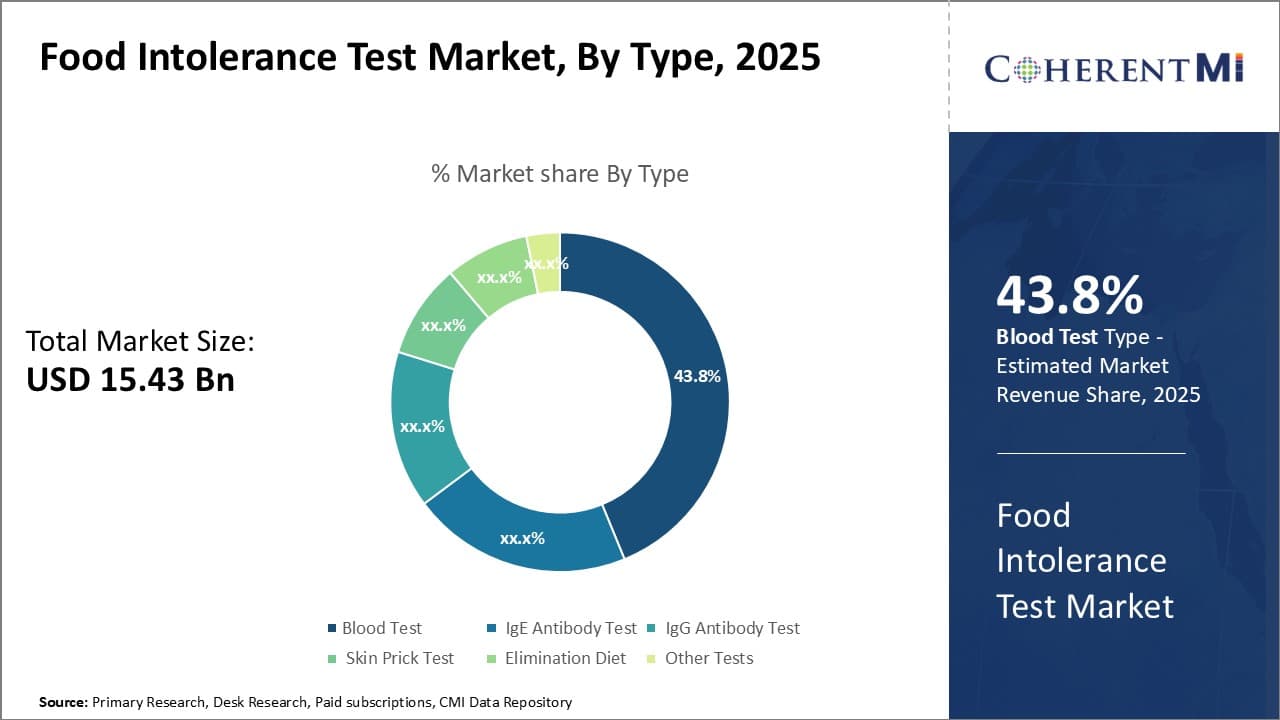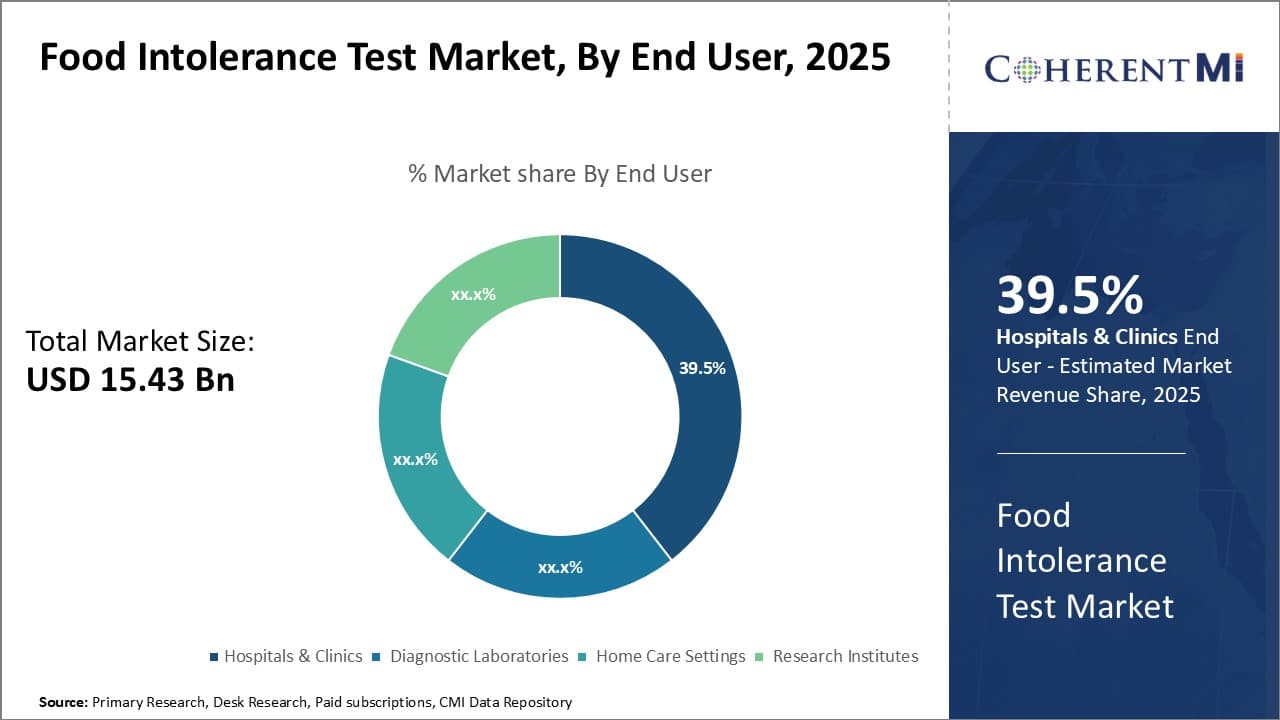Food Intolerance Test Market Size - Analysis
The food intolerance test market is estimated to be valued at USD 15.43 Bn in 2025 and is expected to reach USD 24.78 Bn by 2032. It is projected to grow at a compound annual growth rate (CAGR) of 7.00% from 2025 to 2032. The food intolerance test market is experiencing positive growth trends with rising health consciousness and better diagnosis of food intolerances.
Market Size in USD Bn
CAGR7.00%
| Study Period | 2025-2032 |
| Base Year of Estimation | 2024 |
| CAGR | 7.00% |
| Market Concentration | Medium |
| Major Players | Thermo Fisher Scientific Inc., Alletess Medical Laboratory, Genova Diagnostics, Cambridge Nutritional Sciences, Lifelab Testing and Among Others |
please let us know !
Food Intolerance Test Market Trends
Market Driver - Increasing Concerns Over Adverse Food Reactions
With modern lifestyles and changing dietary patterns, instances of gastrointestinal discomfort, skin conditions, and other food-related health issues have seen a noticeable. Food intolerances, which cause uncomfortable symptoms but are not life-threatening like food allergies, are especially prevalent.
As awareness around food intolerances spreads in society, many are recognizing unexpected symptoms from their regular diets that were previously left unexplained. With busy schedules leaving little time for dietary experimentation, people are seeking faster solutions through specialized diagnostic tests.
Demand for food intolerance tests is also fueled by the growing number of health-conscious individuals who wish to follow an optimized diet. Recent research has also linked certain food intolerances like lactose to various other systemic health conditions including irritable bowel syndrome and osteoporosis. Hence proactive identification of intolerances can positively impact overall well-being in the long run.
This is expected to remain a prominent growth driver for the food intolerance test market.
Market Driver - Tailored Nutrition through Personalized Recommendations
In today's environment where personalized solutions are increasingly valued, consumers want their dietary choices to reflect their unique family history, genes and biological makeup. While general recommendations serve as initial guidelines, fine-tuned advice catering to an individual's personal requirements are believed to provide maximum health impact.
Food intolerance tests allow one's tolerance profile to be objectively surveyed through specialized examinations. The results empower people with actionable, customized diet, and lifestyle strategies to follow rather than making guesses about suspected intolerance issues. Tailored approach of food tolerance tests gives users and healthcare providers definitive, science-backed conclusions regarding risk factors and suitable personalization of macronutrient balance, supplementation if needed, and foods to emphasize or eliminate.
Food intolerance assessment provides the clinical basis for formulating such targeted plans and recommendations. It is a valuable means of empowering proactive self-care through informed, evidence-backed dietary decision making. Thereby, growing popularity of personalized diet regimes is expected to bolster growth of the food intolerance test market.
 To learn more about this report, Download Free Sample Copy
To learn more about this report, Download Free Sample Copy
Market Challenge - High Expense Associated with Food Intolerance Tests
Food intolerance tests can be quite expensive for consumers and this poses a major challenge for the growth of the food intolerance test market.
Comprehensive food intolerance tests that can detect multiple food sensitivities often cost $500 or more. This high pricing puts the tests out of reach for many consumers who want to understand their food intolerances but may not be able to afford regular testing. As a result, the overall size of the food intolerance tests remains moderate despite rising awareness about the importance of identifying food intolerances.
Test providers will need to devise affordable pricing models through volume-based discounts, insurance coverage or introduce lower cost screening tests. This will help drive higher adoption rates and market growth over the long term. Continuous R&D efforts are also crucial to developing newer methodologies and technologies that can help reduce the cost of generating reliable and actionable results for consumers.
Market Opportunity - Innovations in Testing Technologies, such as Molecular Diagnostics
Molecular diagnostic technologies are opening up exciting new opportunities for growth in the food intolerance test market. Traditional allergy tests based on a person's immunological response or recent food consumption history have limitations and varying accuracy levels.
Companies are developing DNA-based, non-invasive saliva tests that can identify dozens of potential food triggers simultaneously at molecular level. Such advanced diagnostic tools promise more definitive, clinically-relevant results to consumers and physicians compared to conventional intolerance screens.
As the technology matures further with declining costs, molecular food intolerance testing can revolutionize diagnosis and pave way for personalized nutrition and dietary plans. It has the potential to grow into a mainstream diagnostic option over the coming years with wider insurance coverage and support from medical community.
Key winning strategies adopted by key players of Food Intolerance Test Market
Players have focused on developing advanced and easy-to-use testing kits to diagnose food intolerances more accurately and conveniently. For example, in 2018, YorkTest Laboratories launched a new at-home food intolerance testing kit called YorkTest FIT that uses a simple blood sample to test for intolerances to top 8 food groups.
Companies are strengthening their digital presence through improved websites and mobile apps. In 2019, YorkTest redesigned their website and launched a mobile app to make food intolerance test results and customized diet plans more accessible on-the-go.
Partnerships with healthcare providers and dieticians have also aided distribution and guidance. For example, through partnerships established in 2017-18 with over 150 physicians' offices, YorkTest saw a 20% year-on-year increase in test sales.
Acquisitions have further expanded service offerings. In 2021, YorkTest acquired the Canadian company IG Laboratories to expand into the lucrative Canadian food intolerance test market. This helped increase YorkTest's international revenues by 15% within the first year.
Segmental Analysis of Food Intolerance Test Market
 To learn more about this report, Download Free Sample Copy
To learn more about this report, Download Free Sample Copy
Insights, By Type: The Convenience and Accuracy of Blood Tests Drive their Market Dominance
In terms of type, blood test contributes 43.8% share of the food intolerance test market in 2025, owing to its convenience and high accuracy. Unlike other tests, blood tests are less invasive and easier for patients to undergo. The ease of sample collection and testing makes blood tests highly preferable for both patients and healthcare providers.
Blood tests also offer the highest diagnostic accuracy among available testing options. By analyzing antibodies and molecules in the blood, it can detect immunity and sensitivities to a wide range of foods. The blood contains cellular and molecular markers that are characteristic of specific allergies and intolerances. This biological evidence provided through a blood sample allows for definitive diagnosis that other symptomatic food intolerance tests cannot match.
The reliability of results encourages both patients and doctors to rely on blood tests as the gold standard for food intolerance identification.
 To learn more about this report, Download Free Sample Copy
Insights, By End User: Hospitals are the Preferred Point of Care for their Diagnostic Expertise
To learn more about this report, Download Free Sample Copy
Insights, By End User: Hospitals are the Preferred Point of Care for their Diagnostic Expertise
In terms of end user, hospitals & clinics contributes 39.5% share of the food intolerance test market. This is primarily due to patients' trust in hospitals for handling diagnostic tests thoroughly and accurately. As medical institutions, hospitals employ trained professionals and use validated processes to examine samples and arrive at well-informed conclusions. Their diagnostic labs are equipped with advanced instruments and knowledgeable pathologists to interpret complex test results.
Moreover, hospitals can provide follow-up consultations and treatment plans seamlessly under one roof. If a food intolerance is identified, doctors in hospitals can collaborate with dieticians and devise personalized dietary modifications and lifestyle advice. Patients feel reassured leaving their diagnostic journey in the hands of hospitals that have end-to-end healthcare solutions. The convenience of 'one-stop-shops' drives patients to prefer hospitals over other end-user segments for food intolerance testing.
Insights, By Product: Instrument-Based Testing Powers Automation and High-Volume Workloads
In terms of product, instruments contributes the highest share of the food intolerance test market due to the advantages of automation. Instrument-based food intolerance tests deploy analyzers, readers and other automated machines to conduct high-throughput sample analysis quickly and efficiently. Advanced instruments can examine dozens of patient samples simultaneously through standardized protocol executions. This mass testing capability is invaluable for commercial and hospital diagnostic labs with large workloads.
Instruments also bring objectivity and accuracy to testing. By removing human errors and subjective assessments, automated analytical instruments ensure test results are swift, precise and consistent. Furthermore, instruments require less specialized technician time per test, reducing labor costs in high-volume settings. Their versatility supports the analysis of diverse biomarkers related to multiple food intolerances. Overall, instrumentation has become indispensable for powering the scale and quality demands of commercial food intolerance testing.
Additional Insights of Food Intolerance Test Market
- The surge in gluten intolerance cases has significantly impacted the food intolerance test market. With more individuals reporting sensitivity to gluten, there is an increased demand for specific tests that can accurately diagnose celiac disease and non-celiac gluten sensitivity, leading to tailored dietary interventions.
- According to a 2022 study by the World Allergy Organization, approximately 15% of the global population suffers from some form of food intolerance, emphasizing the critical need for effective testing and management strategies in food intolerance test market.
Competitive overview of Food Intolerance Test Market
The major players operating in the food intolerance test market include Thermo Fisher Scientific Inc., Alletess Medical Laboratory, Genova Diagnostics, YorkTest Laboratories, Cambridge Nutritional Sciences, Lifelab Testing, Meridian Valley Lab, ImuPro, US BioTek Laboratories, and Vita Health Laboratories.
Food Intolerance Test Market Leaders
- Thermo Fisher Scientific Inc.
- Alletess Medical Laboratory
- Genova Diagnostics
- Cambridge Nutritional Sciences
- Lifelab Testing
Recent Developments in Food Intolerance Test Market
- In July 2023, Thermo Fisher Scientific Inc. announced the acquisition of a novel diagnostic technology firm, enhancing its portfolio with advanced food intolerance testing capabilities. This move is expected to strengthen its market position and offer more comprehensive solutions to customers.
- In April 2023, YorkTest Laboratories launched an innovative at-home food intolerance test kit, allowing consumers to conveniently assess their reactions to over 200 food and drink ingredients. This product aims to meet the growing demand for accessible and personalized healthcare solutions.
Food Intolerance Test Market Segmentation
- By Type
- Blood Test
- IgE Antibody Test
- IgG Antibody Test
- Skin Prick Test
- Elimination Diet
- Other Tests
- By End User
- Hospitals & Clinics
- Diagnostic Laboratories
- Home Care Settings
- Research Institutes
- By Product
- Instruments
- Kits & Reagents
- Services
Would you like to explore the option of buying individual sections of this report?
Sakshi Suryawanshi is a Research Consultant with 6 years of extensive experience in market research and consulting. She is proficient in market estimation, competitive analysis, and patent analysis. Sakshi excels in identifying market trends and evaluating competitive landscapes to provide actionable insights that drive strategic decision-making. Her expertise helps businesses navigate complex market dynamics and achieve their objectives effectively.
